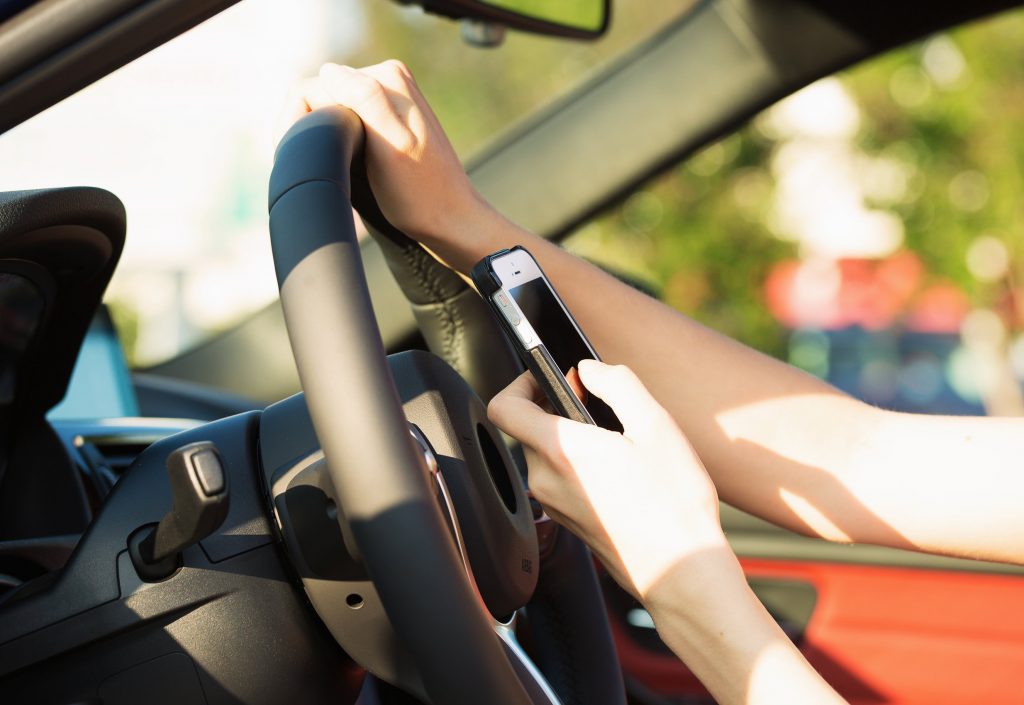Five Reasons Why Texting and Driving is Bad

As the popularity of short message service (SMS) surged in the late 90s, so too have instances of people texting and driving. These days, people have so many ways to send messages on their mobile phones–SMS, iMessage, Facebook Messenger, and Line are just some of the ways that millions of people communicate. Unfortunately, sending text messages while driving is one of the most dangerous forms of distracted driving.
To help you and the drivers in your family understand how serious this issue is, Patterson Legal Group presents five reasons why texting and driving is bad.
Texting and Driving Takes Your Eyes Off of the Road
One of the most basic and most effective ways to drive safely is making sure that your eyes are focused on the road. Carefully watching upcoming road and traffic conditions is a simple but vital element of safe driving. Sending a text message takes your eyes off of the road for at least several seconds, which is more than enough time to get into a serious car accident.
Texting and Driving Takes Your Hands Off of the Steering Wheel
Another essential part of safe driving is keeping two hands on the steering wheel at all times. This helps you maintain precise control of your vehicle, especially in dangerous situations where a split-second adjustment can make the difference between life and death. Manually sending a text message takes one or both of your hands off of the steering wheel. This can have disastrous results.
Texting and Driving Takes Your Mind Off of Driving
When you’re sending a text message, you’re thinking about what you want to say to another person. Perhaps you’re worried about spelling errors or making sure you’re not saying too much. Whatever the case may be, sending a message while driving takes your focus away from the most important task at hand–keeping yourself and your passengers safe. Yes, responding to a message can be very important, but that’s not a reason to put your life and the lives of your passengers at risk.
Using Electronic Devices While Driving Is Illegal
Using your mobile phone or other electronic device while driving is illegal in Kansas and Missouri. You can be fined and lose points on your driver’s license if you’re found guilty of texting and driving. The penalties are especially harsh for teen drivers in Missouri, where fines can be as high as $200 and two points can be deducted from a driver’s license.
Using a Phone While Driving Can Be Fatal
Distracted driving is one of the fastest growing causes of fatal car accidents in America and many experts believe that advancements in mobile phone technology are responsible for the rapid growth. According to the National Highway Traffic Safety Administration (NHTSA), 3,142 people died in 2019 due to distracted driving. The figure represents almost 9% of all car accident fatalities for the year and nearly a 10% increase from the year before.
Injured By a Distracted Driver? Call Patterson Legal Group.
The team at Patterson Legal Group hopes that this blog has helped you understand why texting and driving is so dangerous. Please make sure that the drivers in your household are aware of the consequences of mobile phone use while driving. By making sure that your friends and family are well informed about the issue, we can all help reduce the number of distracted driving car accidents.
If you’ve been injured by a distracted driver then give us a call at 888-687-2400 or connect with us online through LiveChat for a free consultation. Our representatives are available 24 hours a day, 7 days a week to help you explore your options. Patterson Legal Group has a rich history of winning clients the compensation that they deserve, so contact us today to make sure that you get the highest settlement possible.
The information on this blog is for informational purposes only. It is not meant to serve as legal advice for an individual case or situation. This information is not intended to create an attorney-client relationship nor does viewing this material constitute an attorney-client relationship.





